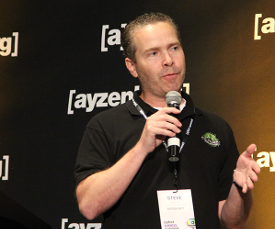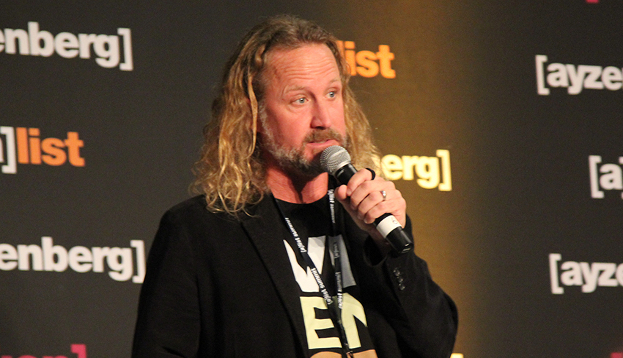There’s no question that eSports has grown over the past few years — but it’s how it’s grown that’s the fascinating story. And two speakers today at the (a)list daily Video Summit in Hollywood focused on how marketable it’s becoming, especially with various partners and heavy talent on board.
First up was Andy Swanson, vice president of eSports for Twitch, who discussed the big numbers coming out of last week’s International tournament in Seattle, which generated an $18 million prize offering, and generated a live audience of 17,000 people (and even more so online). The winning team, Evil Geniuses, took home $6.6 million, one of the biggest prizes to date.
Swanson then broke down how much eSports is expected to grow over the next few years, with $3 billion in offered prizes by 2020 (up from the $1.1 billion estimate for 2017). These numbers make sense, especially considering that a recent League of Legends tournament managed to gain an audience of 32 million viewers — even higher than most events, like the NHL or NBA playoffs.
eSports breaks down into four categories: competition, entertainment, discovery and community, according to Swanson. It actually dates back to well before the age of the Internet, when pinball competitions and Street Fighter II fights gathered players from around the world to compete.
Audiences are expected to reach record numbers over the next few years as well. 44 million eSports fans are expected by 2017 for both North American and European markets, while the number will be even higher in Asia, to the tune of 76 million. While that seems insurmountable, keep in mind that many tournaments, like the ESPN-broadcasted Heroes of the Dorm and this summer’s EVO 2015 fighting tournament, already have a tremendous following.
There are several tiers to consider with the success of eSports, including a publisher/developer hosted eSports league (with Guild Wars 2 or League of Legends), which are broadcasted live on Twitch. These have been spectacularly popular, with 89 million spectators worldwide and 368 million total views on Twitch last year alone, with a total of 11 billion minutes viewed.
So how do brands get involved Swanson posed that question and explained that there are several factors. First, there are devoted media groups that follow the pursuit of eSports full time — kind of like an ESPN specific for the league. There’s also a package of various eSports type tournaments to cover, including DOTA 2, League of Legends and others. Premium event integration and sponsorship also play a part, whether it’s with the events themselves or with the teams that play in them, as Evil Geniuses and other players have no problem gaining partners to back them up. Swanson explained that branding opportunities can also play a part through live player registration, as opportunities to take part in events like the Halo World Championship present a chance to promote products even further while bringing in players. In-broadcast integration can also take a part of the action, and partners can host customized tournaments, like Mountain Dew and Lionsgate, with its action-thrilled John Wick.
Swanson specifically mentioned Duracell, a company that hosted a 26-hour long Madden football tournament to tie in with its 26-hour battery product at the time.
To conclude his part of the presentation, Swanson stated that viewership for eSports has grown stronger than ever over the past few years — and it’ll keep getting better.
 ArenaNet’s Steve Fowler
ArenaNet’s Steve FowlerSteve Fowler, head of global marketing for ArenaNet, followed, explaining the differences in eSports and talking about the power of the Guild War 2 tournaments, including one that recently took place at the Gamescom event in Cologne, Germany. He talked about the passion of players, and how their increased practice with the player vs. player (PvP) mode can help add more dollars to revenue. General play time for these players can range around 722 minutes, but with PvP integration, it grows even higher to 840 minutes.
Fowler then went into the drama that comes with competition, and how a player, Lord Helseth, drummed up intensity with a forthcoming contest by proclaiming a victory ahead of time. His team ended up being third, so after the event, he challenged another player, NoS, to an arm wrestling contest, only to have his arm broken as a result. The community also reacted quite well to non-gaming competition, as one player accidentally fell asleep with his stream still going — a humorous situation that the community was quick to jump in on.
The panel then concluded with a quick community discussion, and how some eSports players are so devoted to their job, they live in “gaming houses” where managers rent the space, enabling them to practice up for forthcoming events.
Yep, eSports are definitely on the up-and-up.

